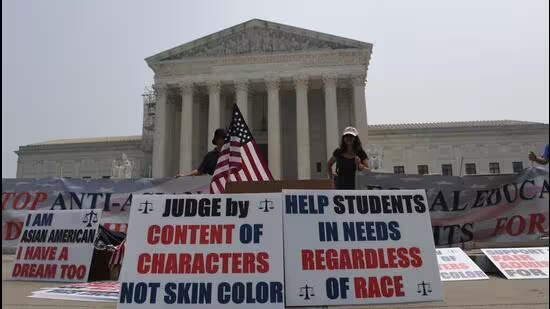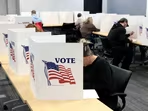US Supreme Court strikes down race as criteria for college admissions
Washington: Race cannot be a factor in determining admissions to colleges and universities in the United States , the Supreme Court has said, in what is a victory for White-American and Asian-American groups but a setback to the policy of encouraging racial diversity through affirmative action that has propelled African-Americans in the American higher education system.

Six SC judges, all conservatives nominated by Republicans to the bench, voted against considering race as a factor, while three judges, all liberals nominated by Democrats to the bench, voted in favour of considering race as a factor.
The court was delivering a judgment in two separate but related cases regarding admission practices in the University of North Carolina (UNC) and Harvard University. At UNC, the petitioners, a group called Students for Fair Admissions (SFFA), claimed that there was discrimination against White and Asian-Americans by giving preference to Black, Hispanic, and Native Americans. In Harvard, SFFA claimed that there was discrimination against Asian-Americans. SFFA claimed that these admission provisions violate the Civil Rights Act of 1964 and Equal Protection Clause of the 14th Amendment. Both universities, in their defence, spoke of their measures as adding to educational diversity.
The majority verdict
In the majority verdict, the court said that the judiciary had, in past verdicts, permitted race-based college admissions only within the confines of narrow restrictions; such programmes must comply with “strict scrutiny”; may never use race as a stereotype or negative; and must, at some point, end. “Respondents’ admission systems fail each of these criteria and must therefore be invalidated under the Equal Protection Clause of the Fourteenth Amendment”, the majority declared.
The court said that the admission systems were not “sufficiently measurable” to permit judicial review; did not articulate a meaningful connection between the means employed and goals pursued of educational benefit of diversity; failed to comply with 14th amendment’s provision that race must not be used as a negative or stereotype by Harvard admitting fewer number of Asian-American students; and lacked a “logical end point”.
“Because Harvard and UNC’s admission programmes lack sufficiently focused and measurable objectives warranting the use of race, unavoidably employ race in a negative manner, involve racial stereotyping, and lack meaningful end points, those admission programmes cannot be reconciled with the guarantees of the Equal Protection Clause…Many universities have far too long wrongly concluded that the touchstone of an individual’s identity is not challenges bested, skills built, or lessons learned, but the colour of their skin. This Nation’s constitutional history does not tolerate that choice,” the majority verdict penned by SC Chief Justice John G Roberts Jr said. Three other conservative judges wrote concurring judgments.
The dissent
In their dissenting judgment, Justices Sonya Sotamayor, Elena Kagan and Ketanji Brown Jackson — incidentally all three women, with Jackson also the first Black woman to be on the bench — said that the court had, long ago, determined that the guarantee of racial equality in the 14th amendment could be enforced through “race-conscious means” in a society that is not, and had never been, “colourblind”.
The limited use of race for the limited purpose of promoting racial diversity, after the historic Brown vs Board decision of 1956 which recognised the necessity of racially integrated schools, had helped equalise educational opportunities for “all students of every race and background” and had improved racial diversity on college campuses, the three justices argued.
“Today, this court stands in the way and rolls back decades of precedent and momentous progress. The Court cements a superficial rule or colourblindness as a constitutional principle in an endemically segregated society where race has always mattered and continues to matter. The Court subverts the constitutional guarantee of equal protection by further entrenching racial inequality in education, the very foundation of our democratic government and pluralistic society,” the judges declared in a powerful dissent.
Offering an outline of America’s history with slavery, Civil War, Reconstruction, the era of segregation, and civil rights movement, the three judges said that “ignoring race” will not equalise a racially unequal society and that equality required an acknowledgment of inequality. They pointed out that both UNC and Harvard had “sordid legacies of racial exclusion” to offer context for their current policies.
The Asian-American versus Black-American fault line
The verdict, which comes almost exactly a year after the SC struck down national protection for abortion rights unleashing a spate of restrictions and outright bans on abortion in a number of Republican-ruled states, is set to become a political issue and inaugurate a new chapter in social fault lines in the American society.
The Democrats have long enjoyed the support of a multi-racial coalition, which includes a majority of both Asian-Americans and Black-Americans. But given the focus of Asian-American communities on higher education, and the clear tensions that the case highlighted between their aspirations and those of Black-Americans who, with their history of exclusion, seek space in the higher educational structure, the fault lines within this coalition may well intensify. Republicans will seek to leverage this internal fault line as they made inroads into Asian-American groups.
But there was an effort by Democrat-leaning Asian-American groups to bridge the gap. In a statement soon after the verdict, AAPI Victory Alliance, a group that seeks to enhance the voice of Asian-American, Pacific-Islanders and Native Hawaiians in politics, expressed its discomfort in framing the issue as between the two communities.
The alliance’s chairperson Tung Nguyen said the verdict undid decades of work. “I question the worth of an admissions letter to an elite world where anti-Asian hate is rampant because we have purchased it by trading away racial solidarity against white supremacy”. AAPI alliance’s executive director Varun Nikore said that the majority of Asian-Americans backed affirmative action for Black people, women and other minorities; studies had shown prospects for admission for Asian-American students increased with race conscious policies; and educational institutions can still provide targeted help to support students.
Disclaimer: The copyright of this article belongs to the original author. Reposting this article is solely for the purpose of information dissemination and does not constitute any investment advice. If there is any infringement, please contact us immediately. We will make corrections or deletions as necessary. Thank you.
Title:US Supreme Court strikes down race as criteria for college admissions
Url:https://www.investsfocus.com









